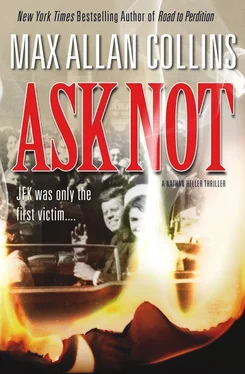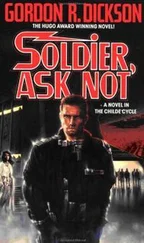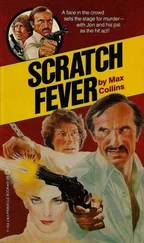“And this is a bad thing?”
I gave him half a smile. “I’m aware you were there, Chuckie. I know you were part of it. Maybe even a shooter.”
His eyes narrowed. He was wondering if he could throw that .22 at me hard enough to buy him time to come around the desk and kill me with my own gun. Anyway, that’s what I’d have been thinking.
I raised a “stop” hand and said, “That’s between you and your maker. I’m not trying to solve the Kennedy assassination.”
“No?”
“No. I already knew it was a conspiracy before it went down — I was in the middle of the Chicago plot early November last year, remember? And I know who the big boys are. Oh, not necessarily all of them by name, but it’s oilmen and other right-wing wackos, and spook pals of ours from Mongoose and the Bay of Pigs, and their Cuban buddies, and of course, obviously, what we’ll quaintly call the Mafia.”
His eyes had disappeared into puffy slits. “If you know everything, Heller, what the fuck can I tell you?”
“Tell me this. Can I... can you ... trust John Rosselli?”
“Huh?”
“When he says there is no Outfit cleanup crew dispatched to tie off loose ends, is he telling the truth?”
“On the grave of my kids,” he said, holding up both big palms, “I don’t know of any.”
“I think you mean on the life of your kids, but their graves might be more apt at that, Chuckie. As I said, my boy Sam was almost run down, and that pisses me off.”
He shrugged. “Sure. That’s over the line.”
“Good. It’s nice to talk to a fucking professional for a change. I don’t think it’s the Company. I have a contact there who I trust, as far it goes. And I don’t think those Cubans could organize a fart in the bathtub.”
“You’re tellin’ me?”
“Then who is tying off the loose ends, Chuckie? And be careful how you answer, because I ask you as one loose end to another.”
That got his attention.
“Only one possibility,” he said, shaking his head as if saying no, which he wasn’t. “That fucking Uncle Carlos. He’s a law unto himself. We do business with him, we have a kind of... understanding with him. But he stands apart. He doesn’t view this Thing of Ours as a club he’s in.”
“Most of the deaths are in Texas. Some that I haven’t looked into yet are in Louisiana.”
Chuckie nodded. “Marcello controls all of Texas and Louisiana, and he and Santo got Florida, too. So if I was to suggest something to you, Heller... as one pro to another... as one... loose end to another... if you want to shut this thing down, you already know where you have to go.”
“New Orleans,” I said.
“New Orleans,” he said, nodding.
Where in two weeks Flo and I would have continued our investigation, before this latest convenient tragedy had come along. I’d be taking that Big Easy trip all right, but my next stop would be Manhattan.
I got to my feet and slipped the nine millimeter into its leather womb. “You’ll find your slugs in that wastebasket, Chuck. If you reload your clip and come running after me, I’ll know I misjudged you.”
“You didn’t, Nate.”
He held out his big hand and I shook it.
Shook the hand of one of the likely assassins of John F. Kennedy.
The brown-brick facade of the five-story town house on East Sixty-eighth Street, squeezed between similar nondescript buildings, concealed a glittering twenty-two-room world as imagined and executed by Flo Kilgore.
I had never set foot in the place before. Despite her fame and fashion, Flo had always struck me as a scrappy small-town kid who made it big. But this decadently elegant display — French doors, chandeliers, gilt-framed landscapes, rosewood furnishings — made sense only if Flo had seen Gone With the Wind at an impressionable age and grew up determined to replicate Tara in Manhattan. Hell, she even had black servants, although I didn’t see any that looked like Aunt Jemima or Uncle Ben.
Of course, the blackest thing in this otherwise opulent town house was the unique room on the third floor, its four walls and ceiling black, as if painted overnight to mourn the town house’s late hostess. It was filled with bizarre bric-a-brac — shelves of sculpted and wooden hands, toy banks, music boxes, and numerous variations on the American eagle. A big antique Revolutionary War — style snare drum had been converted to a coffee table with two red child-sized chairs. A gigantic oil painting of General Custer and his men chasing Indians (wishful thinking?) dominated the room, hanging over a low-slung sofa with black cushions and an intricately carved wooden frame painted an iridescent blue. Cigar-store Indians, positioned here and there, seemed to be viewing Custer with understandable skepticism.
Still, it was a lived-in space. Black throw pillows were on the dark-green carpet near a 21-inch TV (its cabinet painted black, of course) in one corner. Those kid-sized chairs by the drum table indicated this wasn’t a living room so much as a family room, a rec room.
I’d worn a black Botany 500 suit with a black tie, out of respect, but I felt like I was disappearing into the stygian surroundings as I sat beside Frank Felton on the sofa. He was in a black suit, as well, with a black necktie, and we might have been two undertakers waiting to talk to the family, when of course he was the family.
“I’m afraid this room represents something of a practical joke,” he said with forced cheer.
“Joke?” I said. I felt like I’d walked into a Charles Addams cartoon, in search of the punch line.
Felton was in his mid-fifties but looked ten years older. You could just barely see, in that reddish, puffy, vein-shot face, the handsome young comic actor he’d once been. His dark eyes had the seldom-blinking, slightly widened look of a man on a bridge admiring a sunrise as he contemplated jumping off. Only his voice retained its radio youth — Yours Truly, Johnny Dollar...
“Well, Florrie Mae was so determined to make a gleaming showplace out of these digs,” he said, “I suggested we have one fun room.”
“Ah,” I said, noticing on a nearby shelf a rustic wooden hand with candle-speared spikes rising out of the fingertips.
“Just a space where we could let our notions of the bizarre run wild.” He grinned, displaying yellowed, questionable teeth. “A lot of times, we’d play ‘Count the Eagles.’”
“Oh?”
He nodded. His eyes were staring past me into a memory. “We’d ask guests to close their eyes and test their powers of observation — how many eagles had they noticed in the Black Room? That’s what we call it, the Black Room.”
“Catchy,” I said.
“You wouldn’t believe the parties this space has seen,” Felton said. “I loved to plan the things, stage them like a film or Broadway production.”
“Ah,” I said.
“On one anniversary bash, we turned the Black Room into an inferno — simulated, of course — for a ‘Saints and Sinners’ costume party. So many beautiful people, frolicking among the faux fire and brimstone. We had gambling in another room, a small orchestra for dancing downstairs, an arcade with pinball machines, Moviolas playing silent movies. That ebony baby grand over there, top recording talent performed just for the privilege of being part of it all.”
Probably not Sinatra — he and Flo had carried on a famous feud, her calling him a gangster, him calling her “the chinless wonder.” I’d seen her cry over that.
Felton was saying, “Guests were challenged to come as their favorite sinners from mythology, literature, history. I left it up to Florrie Mae what sinners to choose for us. You will never guess what she picked.”
Читать дальше












